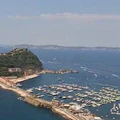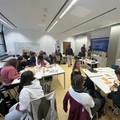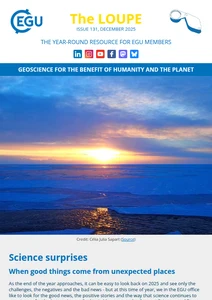President: Heidi Kreibich
(Emailnh@egu.eu)
Deputy President: Nivedita Sairam
(Email)
ECS Representative: Elisa Grazia Lucia Nobile
(Emailecs-nh@egu.eu)
The Natural Hazards (NH) Division covers all natural hazards that can produce damage to the environment and to the society. Therefore, it is a place where scientists and researchers of various geosciences disciplines meet with sociologists, economists and people responsible for territorial and urban security and planning policies. The aim is to improve the understanding of the evolution of the processes and to discuss new technologies, methods and strategies to mitigate their disastrous effects. The division is structured in eleven subdivisions as follows: Hydro-Meteorological Hazards, Volcanic Hazards, Landslide and Snow Avalanche Hazards, Earthquake Hazards, Sea and Ocean Hazards, Remote Sensing, AI, Data Science & Hazards, Wildfire Hazards, Environmental, Biological and Natech Hazards, Natural Hazards and Society, Multi-Hazards and Climate Hazards. Most of the topics that are treated in the NH Division are also treated in other EGU divisions, which is expected due to the intrinsic transversal nature of the NH Division.
The NH Division is one of the historical Divisions of the EGU that was established when EGU was founded and has been and is one of the largest divisions to which many geo-scientists provide steadily contributions of papers and ideas over the years.
As for all EGU Divisions, an Early Career Scientist Award is established also for the NH Division and is given to young researchers who obtain outstanding results in the assessment and mitigation of natural hazard. In addition, the NH Division awards the Plinius Medal that recognises outstanding interdisciplinary natural-hazard research and the Soloviev Medal that recognises outstanding scientific contributions in fundamental research on natural hazards. Both medals are open for all career stages.
Latest posts from the NH blog

Hunting for historical Adriatic meteotsunamis
Before modern instruments, our only clues about past sea events came from written records and folklore. Along the eastern Adriatic coast, stories of sudden floods and “tidal waves” (locally called šćiga) have been passed down for generations. These waves, described as rapid rises and falls of the sea that could flood or empty harbours within minutes, were carved into Adriatic coastal life as rare but unforgettable events. Today, we know that many of them were meteotsunamis: tsunami-like waves triggered by …
Read more

Living with a restless giant: The challenge of multi-risk management and communication at Campi Flegrei Volcano
Nestled within one of Europe’s most densely populated regions, the Campi Flegrei caldera is a volcanic system whose secular unrest shapes the daily life of its inhabitants. Here, during the last decade and still ongoing crisis, ground uplift, frequent earthquakes, and persistent gas emissions interact to create a complex, evolving multi-risk environment. These natural hazards rarely follow simple patterns: they overlap, cascade, or unfold independently, challenging scientists, authorities, and communities alike. As the ongoing unrest intensifies, long-standing questions about forecasting, …
Read more

How can we encourage and empower Early Career Researchers? Reflections on a short course held at EGU 2025
At the EGU General Assembly 2025, we initiated a short course entitled “Best Practices for Early Career Researcher (ECR) Engagement and Empowerment in Research Projects”, designed and led by Early Career Researchers (ECRs). The goal was to provide an interactive platform for ECRs, project leaders, and anyone involved in research projects to come together, reflect, share experiences, co-learn, and create a consensus on best practices for engagement and empowerment. Roughly 70 international participants, mostly ECRs themselves, joined the short course. …
Read more

From Classroom to Community: Bridging Disaster Risk Reduction Education with the Real World Through Service-Learning
This week, we turn our attention to education and collaboration in Disaster Risk Reduction (DRR). Dr. Solmaz Mohadjer has been leading an innovative Service-Learning course that brings students together with non-profit organisations working at the forefront of risk reduction. The course not only introduces students to the complexities of disasters and resilience but also creates space for dialogue and partnership between academia and practice. We spoke with Solmaz to learn more about the vision behind the course, its impact on …
Read more
Recent awardees

The 2025 Plinius Medal is awarded to
Annegret Henriette Thieken in recognition of outstanding contributions to the understanding and mitigation of flood risk, and the design of adaptation management strategies informed by the involvement of affected communities.
Read more

- 2025
- Sergey Soloviev Medal
The 2025 Sergey Soloviev Medal is awarded to
Sergio M. Vicente-Serrano for creating a novel drought indicator, which has become the benchmark for quantifying droughts, and for pioneering studies in the integration of different drought typologies.
Read more

- 2025
- Outstanding Student and PhD candidate Presentation (OSPP) Award
The 2025 Outstanding Student and PhD candidate Presentation (OSPP) Award is awarded to
Clarence Gagnon The role of extratropical cyclones in flooding in Quebec, Canada, from 1991 to 2020
Read more

- 2025
- Outstanding Student and PhD candidate Presentation (OSPP) Award
The 2025 Outstanding Student and PhD candidate Presentation (OSPP) Award is awarded to
Julián Montejo Optimal site hazard grid for probabilistic risk assessment: A two-step approach
Read more

- 2025
- Arne Richter Award for Outstanding Early Career Scientists
The 2025 Arne Richter Award for Outstanding Early Career Scientists is awarded to
Mariana Madruga de Brito for outstanding contributions to understanding of the socio-economic impacts and risk mitigation of extreme hydrological events, using natural language processing and social science computational methods.
Read more
Current issue of the EGU newsletter
In our December Issue we we are focusing on positive stories of surprises in science. Asmae Ourkiya shared how a prize established in 1900 to reward anyone making contact with alien life (expect Martians) ended up funding more than a century of astronomy research and innovation. Guest blogger Fernanda Matos described the discovery her autism had been driving her interest in Oceanography for years, in her blog on how we can better support people with disability in geoscience. And we highlight some surprises to avoid in our blog on the Austrian visa and Schengen system ahead of EGU26. Also catch up on all the upcoming dates for webinars and funding, including €10,000 to host a Geoscience Day event in your European country, and share your opinions on where EGU should be focusing strategically in the next 5 years in the EGU Members' Survey.
All this and much more, in this month's Loupe!
Read more
Current issue of the NH division newsletter
Welcome from the NH Division Team
Dear colleagues and friends,
We’re excited to share the very first issue of the newsletter from the EGU Natural Hazards (NH) Division! With this newsletter, we aim to keep you informed, connected, and inspired — whether you’re a long-time member or newly joining our community.
This inaugural issue is timed with the EGU General Assembly 2025, and it’s packed with highlights, upcoming events, and ways to get involved.
Read more











